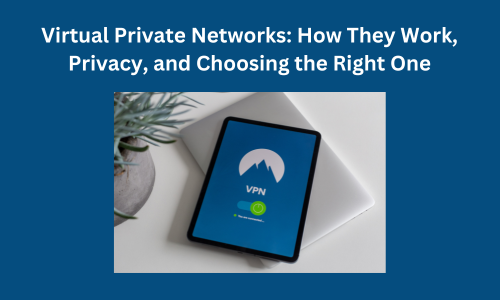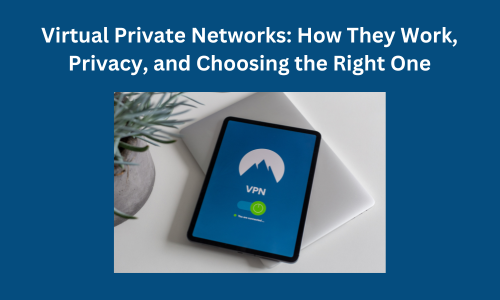


In today's world, where online privacy and security are growing concerns, Virtual Private Networks (VPNs) have become essential tools for anyone who values their digital freedom. Whether you're accessing sensitive data over public Wi-Fi, bypassing content restrictions, or simply trying to maintain your privacy, VPNs offer a layer of security that is increasingly necessary in the modern internet landscape.
But what exactly is a VPN, how do they work, and are they as decentralized as they appear? In this article, we'll break down these concepts and offer guidance on how to choose the right VPN for your needs.
A Virtual Private Network (VPN) is a service that creates a secure, encrypted tunnel between your device and the internet. When connected to a VPN, your online traffic is routed through a remote server operated by the VPN provider, masking your real IP address and encrypting your data.
This process serves two main purposes:
At its core, a VPN works by creating a secure, encrypted connection between your device (e.g., a computer, smartphone, or tablet) and a remote server operated by the VPN provider. This process involves a few key components:
Encryption: When you connect to a VPN, your internet traffic is encrypted using complex algorithms, ensuring that any data you send or receive is protected from unauthorized access. Even if a hacker intercepts your data, it will appear as gibberish unless they have the decryption key.
Tunnelling Protocols: VPNs use specific protocols to establish a secure connection between your device and the server. Common protocols include OpenVPN, L2TP/IPsec, IKEv2, and the newer WireGuard. Each has different strengths in terms of security, speed, and performance.
IP Masking: Instead of your real IP address being visible, the websites you visit only see the IP address of the VPN server. This makes it more difficult for websites to track your location and online behaviour.
Despite their ability to provide privacy and anonymity, most traditional VPNs are not fully decentralized. They rely on centralized servers owned and operated by VPN providers. This centralization presents potential privacy concerns, as the VPN provider has access to your data and could be legally compelled to hand it over, depending on its location and the laws of its jurisdiction.
However, decentralized VPNs (dVPNs) are emerging as an alternative. These operate using blockchain technology or peer-to-peer networks, distributing the VPN infrastructure across multiple nodes. Since dVPNs have no central authority or server, they reduce the risk of data being exposed through a single point of failure. However, they are still relatively new, and their reliability and performance vary compared to traditional VPN services.
Using a VPN provides several key advantages:
Enhanced Privacy: By masking your IP address, VPNs make it harder for websites, advertisers, and even your ISP to track your browsing activity.
Improved Security: VPNs add an extra layer of security by encrypting your data, protecting it from hackers, especially when you're using unsecured public Wi-Fi networks.
Bypass Geo-Restrictions: A VPN allows you to access content that may be restricted in your country by connecting to servers in different regions. This can be useful for streaming platforms like Netflix, where content libraries vary by location.
Avoid ISP Throttling: ISPs sometimes slow down certain types of traffic, such as video streaming or gaming. A VPN hides your activity from your ISP, preventing this kind of bandwidth throttling.
While VPNs are powerful tools for privacy and security, they are not without their limitations:
No Complete Anonymity: Although VPNs obscure your identity, they don’t make you completely anonymous. Advanced tracking techniques, such as browser fingerprinting, can still identify users.
Speed Reduction: VPNs can slow down your internet connection due to the encryption process and the additional distance your data must travel to reach the VPN server.
Trust in VPN Providers: Centralized VPN services have access to your data. Some providers may log your activities or be legally required to provide user information, depending on their jurisdiction.
With so many VPN services available, choosing the right one for your needs can be overwhelming. Here's what to consider:
Privacy Policy: A strong privacy policy is essential. Look for a VPN with a no-log policy, meaning they don’t store any records of your online activity. This ensures that even if the VPN provider is asked to provide data, there’s nothing to hand over.
Jurisdiction: VPN providers located in countries with strict privacy laws (like Switzerland or Panama) are often better for privacy. Avoid providers based in countries that are part of surveillance alliances like the Five Eyes or Fourteen Eyes, which may require companies to share data with government agencies.
Security Features: Check for features like a kill switch, which automatically disconnects you from the internet if the VPN connection drops, ensuring that your data is never exposed. Other features to look for include DNS leak protection and multi-factor authentication.
Server Network: The more servers a VPN has, the better it can handle traffic without slowing down. A large network also allows you to connect to a wider range of locations, which is useful for bypassing geo-restrictions.
User-Friendly Interface: A good VPN should be easy to set up and use. Look for a provider with apps that work across multiple platforms (Windows, Mac, Android, iOS) and provide a seamless user experience.
Speed and Performance: If you're using a VPN for streaming, gaming, or downloading large files, speed is crucial. Some VPNs offer optimized servers for high-speed activities, so make sure you choose one that doesn’t compromise too much on performance.
Cost: While there are free VPN options, they often come with limitations such as slower speeds, bandwidth caps, or intrusive ads. Paid VPNs usually provide better performance, security, and privacy protections.
VPNs have various practical uses beyond personal privacy. Here are a few scenarios where VPNs are particularly useful:
Travellers: VPNs allow people travelling abroad to access content or services that may be restricted in their location, such as social media platforms or streaming services.
Journalists and Activists: In countries with strict censorship, VPNs enable journalists, activists, and citizens to communicate securely and access uncensored information.
Remote Work: For employees working remotely, VPNs are vital for securing company data. Many businesses require VPNs to protect sensitive information when accessing corporate networks from outside the office.
It’s important to understand how VPNs differ from other tools designed to protect privacy:
VPN vs. Proxy: Proxies can also hide your IP address, but they do not encrypt your data, making them less secure than VPNs.
VPN vs. Tor: Tor provides much stronger anonymity than VPNs by routing traffic through a series of volunteer-operated nodes, but it’s slower and not as user-friendly. Tor is ideal for users needing extreme privacy, while VPNs offer a balance between privacy and performance.
VPN vs. Smart DNS: A Smart DNS can help you bypass geo-restrictions but does not provide encryption or privacy features like a VPN. It’s mainly for accessing content, not securing your connection.
While VPNs are legal in most countries, there are a few exceptions. Some governments, such as those in China, Russia, and Iran, heavily regulate or outright ban the use of VPNs. It’s important to check the local laws regarding VPN usage if you’re travelling to or living in a country with strict internet regulations.
Finally, let’s clear up some common misconceptions about VPNs:
Total Anonymity: VPNs can protect your privacy, but they don’t make you invisible online. They don’t stop websites from tracking you through cookies or prevent browser fingerprinting.
Malware Protection: VPNs encrypt your data, but they don’t prevent malware infections. You still need antivirus software to protect against malicious programs.
Legal Immunity: Using a VPN doesn’t give you a free pass to engage in illegal activities. If law enforcement has reason to investigate, they can still track down your activities in other ways.
VPNs are essential tools for anyone who values online privacy, security, and freedom. However, they aren’t a one-size-fits-all solution. To get the most out of a VPN, it's crucial to understand how they work, their limitations, and the features that best meet your needs.
By carefully choosing a VPN provider and combining it with other good security practices, you can enjoy a safer and more private online experience.
Disclaimer: This article is provided for informational purposes only. It is not offered or intended to be used as legal, tax, investment, financial, or other advice.
